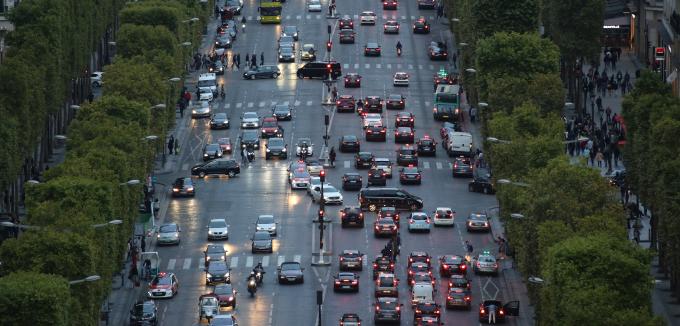AFP
Traffic on the Champs-Elysees: Paris wants 2024 no diesel cars left in the city
The Court of the European Union (ECJ) has opened the gate for driving bans against diesel cars the latest generation. The court declared on Thursday a regulation of the European Union commission to higher emission values for diesel of the emission standard euro 6 for partially void. The cities of Paris, Brussels and Madrid are thus allowed to challenge the nitrogen oxide limits set out there and, in case of doubt, shut out diesel cars – even though these have been officially approved.
The background to the dispute is that the EU Commission had subsequently increased the limit values when introducing the new exhaust gas test RDE, which measures emissions on the road instead of in the laboratory. Instead of the 80 milligrams of nitrogen dioxide per kilometer prescribed in the Euro 6 regulation, the diesel cars are allowed to emit 168 milligrams and then 120 milligrams for a transitional period. The Commission justified this with measurement inaccuracies.
She had made the decision shortly after the announcement of the diesel scandal in 2015. At that time it was clear that car manufacturers manipulate the exhaust gas tests in the laboratory, so that the cars emit far less exhaust gases there than on the road. Thus, the carmakers were able to meet the official limits, although their cars did not get cleaner in real operation. Exactly with this practice, the RDE test should actually put an end.
Paris, Madrid and Brussels tighten conditions
If cars are allowed to emit more of the nitric oxide irritant gases, it will make it harder for cities to comply with legal air quality regulations. Paris, Madrid and Brussels had tightened the rules for their environmental zones in recent years. Paris is even pursuing the plan, from 2024 no diesel cars left in the city.
In its ruling, the lowest EU court has now ruled that cities can sue against the EU Commission’s increased limits. The Commission had denied that. The court found that the Commission should not have allowed the Euro 6 threshold to weaken in the RDE test. This is justified by the fact that the limit of 80 milligrams had to be complied with in the regulation “in practical driving and thus in the RDE tests”. That was an “essential provision” which the Commission could not amend.
Twelve months for implementation
The judges give the Commission twelve months to lower the thresholds. The period starts in two months – if the Commission does not appeal to the European Court of Justice (ECJ).
Whether the judgment has direct effects on the driving restrictions in Germany, is questionable. So far, only cars of Euronorm 4 or worse are affected by lockouts. According to a ruling of the Federal Administrative Court, Euro 5 diesel engines may not be banned from September 2019 at the earliest.
It is open, whether afterwards also Euro-6-Diesel get. On the one hand, the nitrogen oxide levels are falling in most cities, and on the other hand, the Federal Government has decided to soften the limit values for nitric oxide in city air and wants to exempt cars of the Euro standard 6 from driving bans. However, it is unclear whether these rules are compatible with European law.
la / reuters / afp

